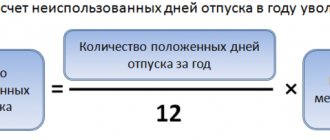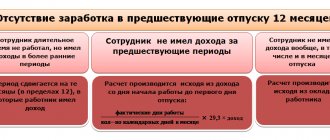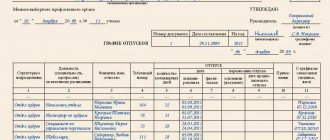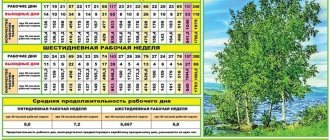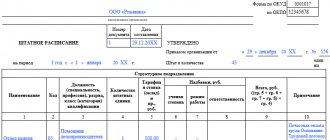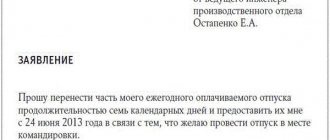19.07.2019
0
166
4 min.
All officially employed citizens have the legal right to annual paid rest. But sometimes working agreements are concluded for a period of less than a year. The article explains how to register leave for a fixed-term employment contract and what its duration is in various situations.
Vacation according to TC
The duration of leave when concluding a fixed-term employment contract is determined by Art. Art. 291.293, 295 of the Labor Code of the Russian Federation, as well as Letter of the Ministry of Labor dated January 1, 2002 No. 625-ВВ.
Vacation according to the Labor Code of the Russian Federation is calculated as follows:
- In the case of concluding a temporary employment contract for a period of up to six months to perform seasonal work, vacation pay is calculated according to the principle of 2 working days of vacation for 1 month of work. When calculating in this way, weekends and holidays are not taken or paid on vacation days.
- To perform work for a period of more than two months, not related to the time of year, the calculation is based on the principle of 2.33 days of rest for each month of work, i.e. According to the minimum rest time established by law for a year of work, it is 28 calendar days.
Every working citizen has the right to rest, however, in the case of a temporary contract, the employer can provide leave with subsequent dismissal upon expiration of the agreement. Most often, this method of dismissal is practiced after an employee has been hired for seasonal work. If the employee has been hired for more than several years, then he can apply for leave after six months of work.
Varieties
The above rules apply to the most common, annual, type of leave. In addition to this, an employee may need the following types of rest:
- additional;
- maternity leave;
- training.
If an employee is entitled to additional vacation days, under a fixed-term contract under the Labor Code of the Russian Federation they must also be taken into account. This should be done in proportion to the time of employment, that is, divide the required number of days by 12 and multiply by the number of months actually worked.
Maternity leave
The rights of pregnant employees are not limited in any way by the duration of the employment agreement. The employer will have to provide the woman with the required time after her request. It will be possible to cancel a contract with a subordinate only after giving birth.
It is important to know! During the maternity leave, the woman will have to provide a medical certificate confirming pregnancy. But it cannot be required more often than once every 3 months. The organization is not obliged to keep an employee’s place while caring for a child under 3 years of age if the agreement has expired before that time.
Training
Citizens of the Russian Federation can also receive study leave under a fixed-term employment contract. This time includes additional days for passing the session. If the exam period falls during the term of the agreement, the employer will need to release the employee. In the event that a subordinate voluntarily renounces the right to days off, monetary compensation is not required.
Types of vacations
When concluding a fixed-term employment contract, a future employee of the organization must independently familiarize himself with all the provisions. Particular attention should be paid to the rules for granting leave and the amount of compensation for it. Depending on the type of leave, the rules for its provision and payment may vary significantly.
Annual
Annual paid leave is provided to all employees of the organization with whom an employment contract has been concluded on a fixed-term or indefinite basis. The only exception to the rules for providing rest is the conclusion of a civil contract, in which the guarantees of the Labor Code of the Russian Federation do not apply to the employee. As a general rule, every working citizen must have 28 days of rest annually, which are certainly paid.
For employees on a fixed-term basis, whose duties do not exceed two months, leave is calculated on the basis of 2 working days for each month worked. The same principle applies to calculations in case of employment for any season.
Annual leave for conscripts, if their work time is more than two months and is not seasonal, is calculated according to the general rule for compiling leave.
Additional
The labor legislation of the Russian Federation does not regulate the provision of additional leave to temporary workers, which means that this type of leave is provided on a general basis based on the actual time of work.
The general grounds for providing time for rest are regulated by Ch. 19 of the Labor Code of the Russian Federation, the rules and features of the provision of additional leaves are regulated by articles 116-119 of the Labor Code of the Russian Federation, while their duration is calculated in calendar days and is not limited to any established limit. The legislation establishes the minimum amount of additional rest for an employee, depending on the rights to provide it.
In the case of additional leave, employees working in the Far North are given 24 days of rest for the previous year of work. This means that when performing duties under a fixed-term employment contract, such employees will be provided with additional leave at the rate of 2 calendar days per month of work. The calculation occurs in a similar way under other circumstances, i.e. the total additional vacation time is divided by the number of months in a year and multiplied by the number of months that the employee worked in the organization.
Maternity leave
Providing maternity leave to employees with whom fixed-term employment contracts have been concluded is regulated by Art. 261 Labor Code of the Russian Federation.
Providing maternity leave to employees working on a fixed-term basis follows the general rule, with the exception of the following features:
- If the contract expires during the employee’s pregnancy, the employer, if there are grounds confirming the pregnancy, is obliged to extend the contract until the birth or until the expiration of maternity leave.
- When extending the agreement before childbirth, the woman is obliged to provide the employer with a certificate of pregnancy, but not more often than once every three months.
- In the case of carrying out labor activities under a fixed-term contract after childbirth, the employer may terminate the employment contract based on the expiration of its validity.
Termination of labor relations with a pregnant woman is not allowed, even if a fixed-term employment contract is concluded for a certain period, with the exception of cases of liquidation of the organization.
Training
Art. 59 of the Labor Code of the Russian Federation establishes the possibility of fulfilling labor duties for full-time and part-time students of secondary specialized and higher educational institutions. The legislator specifies that students can be hired for a seasonal period or at any other time and for any period.
The rights of student workers are regulated by Art. 59 of the Labor Code of the Russian Federation, however, if the training period is completed, the rights of these employees are regulated by the general rules and guarantees established by labor legislation. Student employment is carried out on a temporary basis, usually until he graduates from the educational institution, due to the need to comply with labor legislation.
At the same time, the right to rest for such workers is regulated by the general rules for granting leave to conscripts, while the possibility of taking out study leave during the period of validity of a fixed-term employment contract completely depends on the employer or the collective agreement, if there is one at the enterprise.
The obligation to provide study leave to an employee working on a fixed-term basis is not legally established, therefore such provisions must be prescribed individually or discussed with the employer during employment.
MY RIGHTS: HOW TO PROTECT YOUR RIGHTS
Types of vacations
Vacation is a period of long-term rest for an employee with a special legally regulated procedure for provision.
During the vacation period, the employer retains the employee’s place of work, position and average earnings, except for vacation without pay.
The Labor Code of the Russian Federation divides vacations into the following types:
- annual paid holidays:
annual basic paid leave;
- annual additional paid leave;
- annual extended basic leave;
- additional leave while maintaining average earnings;
Chapter 19 “Vacation” of the Labor Code of the Russian Federation (as amended on 02/05/2018)
The procedure for granting vacations to employees:
- The order of granting paid vacations is determined annually in accordance with the vacation schedule ;
- the total duration of annual paid leave is determined by summing up the annual main and all additional annual paid leaves;
- in cases established by law, annual paid leave may be extended or postponed to another period determined by the employer taking into account the wishes of the employee;
- the unused part of the annual paid leave exceeding six months is added to the next annual paid leave for the next year;
- By agreement between the employee and the employer, annual paid leave can be divided into parts . Moreover, at least one part of this leave must be at least 14 calendar days ;
- An employee's recall from vacation is permitted only with his consent. The part of the vacation not used in this regard must be provided at the employee’s choice at a time convenient for him during the current working year or added to the vacation for the next working year;
- a part of the annual paid leave exceeding 28 calendar days , upon a written application from the employee, can be replaced by monetary compensation ;
- upon written application of the employee, unused vacations may be granted to him with subsequent dismissal, with the exception of cases of dismissal for guilty actions. In this case, the day of dismissal is considered the last day of vacation.
For part-time employees:
- annual paid leave is provided to employees simultaneously with leave for their main job;
- If the employee has not worked for 6 months at a part-time job, then leave is provided in advance.
The procedure for providing employees with annual basic paid leave:
- annual basic paid leave can be calculated in calendar or working days, as well as in days (for some employees);
- the duration of the annual basic paid leave cannot be less than 28 calendar days;
- some employees are granted extended annual basic paid leave , lasting more than 28 calendar days;
- if the employment contract includes a condition for vacation of less than 28 calendar days, such a condition is invalid.
Employees who are granted extended basic paid leave (more than 28 calendar days):
- disabled people:
30 calendar days;
- 31 calendar days;
- from 42 to 56 calendar days (depending on the position);
- from 49 to 56 calendar days (depending on the type of work performed);
- 30 calendar days;
- from 30 to 40 days (depending on the length of service in rescue positions).
The procedure for providing employees with annual additional paid leave
The employer is obliged to provide annual additional paid leave to the following categories of employees:
- for working under harmful or dangerous working conditions:
The duration of leave depends on the degree of harmfulness or danger of working conditions and is established based on the results of a special assessment of working conditions. The minimum duration of additional leave is 7 calendar days;
- the list of categories of employees for whom leave is established, as well as its minimum duration and conditions for provision are determined by the Government of the Russian Federation;
- for work in the regions of the Far North, leave is granted - 24 calendar days, in areas equated to the regions of the Far North - 16 calendar days, in other regions of the North, where a regional coefficient and percentage increase are established - 8 calendar days;
Article 321 “Annual additional paid leave” of the Labor Code of the Russian Federation; Article 14 “Additional leave” of the Law of the Russian Federation of February 19, 1993 N 4520-1 “On state guarantees and compensation for persons working and living in the Far North and equivalent areas” (as amended on March 7, 2018)
- for work on irregular working hours:
The minimum duration of vacation is 3 calendar days. The specific duration is established in the internal labor regulations and collective agreement;
- the minimum duration of leave and the conditions for its provision are determined by Decree of the Government of the Russian Federation dated April 21, 2010 No. 258.
Decree of the Government of the Russian Federation of April 21, 2010 No. 258 “On the minimum duration of annual additional paid leave and on the conditions for their provision to employees of representative offices of the Russian Federation abroad” (as amended and supplemented on March 25, 2013)
- to the athlete:
The minimum duration of vacation is 4 calendar days. The specific duration of leave is determined by a collective agreement, local regulations, or employment contract;
Article 348.10 “Additional guarantees and compensation for athletes and coaches” of the Labor Code of the Russian Federation
- to the coach:
The minimum duration of vacation is 4 calendar days. The specific duration of leave is determined by a collective agreement, local regulations, or employment contract;
Article 348.10 “Additional guarantees and compensation for athletes and coaches” of the Labor Code of the Russian Federation
- medical workers:
The list of positions of medical workers entitled to additional leave and its duration are approved by Decrees of the Government of the Russian Federation dated 06/06/2013 No. 482, dated 12/30/1998 No. 1588, dated 04/03/1996 No. 391.
Decree of the Government of the Russian Federation dated 06.06.2013 No. 482 “On the duration of the annual additional paid leave for work with harmful and (or) dangerous working conditions provided to certain categories of employees” (as amended on 06.23.2014); Decree of the Government of the Russian Federation of December 30, 1998 No. 1588 “On establishing for general practitioners (family doctors) and nurses of general practitioners (family doctors) an annual additional paid 3-day leave for continuous work in these positions”; Decree of the Government of the Russian Federation of April 3, 1996 No. 391 “On the procedure for providing benefits to employees exposed to the risk of contracting the human immunodeficiency virus while performing their official duties”
- veterinary and other workers involved in the provision of anti-tuberculosis care, as well as workers serving farm animals with tuberculosis:
the minimum duration of leave is determined in the Decree of the State Committee for Labor of the USSR, the Presidium of the All-Union Central Council of Trade Unions dated October 25, 1974 No. 298/P-22, and the Decree of the Government of the Russian Federation dated June 6, 2013 No. 482;
- the duration of the vacation is determined in the Decree of the State Committee for Labor of the USSR, the Presidium of the All-Union Central Council of Trade Unions dated October 25, 1974 No. 298/P-22, and the Decree of the Government of the Russian Federation dated June 6, 2013 No. 482;
- the duration of the vacation is determined in the Decree of the State Committee for Labor of the USSR, the Presidium of the All-Union Central Council of Trade Unions dated October 25, 1974 No. 298/P-22, and the Decree of the Government of the Russian Federation dated June 6, 2013 No. 482;
- duration of vacation - 14 calendar days or 7 calendar days;
clause 5, part 1 of Article 14 “Compensation for harm and measures of social support for citizens who received or suffered radiation sickness, other diseases, and disabled people as a result of the Chernobyl disaster”, clause 4, part 1 of Article 19 “Compensation for harm and measures of social support for citizens, permanently residing (working) in the territory of the residence zone with a preferential socio-economic status" Law of the Russian Federation dated May 15, 1991 No. 1244-1 "On the social protection of citizens exposed to radiation as a result of the disaster at the Chernobyl nuclear power plant" (as amended on March 18, 2018 )
- rescuers of professional emergency rescue services, formations:
duration of vacation - no more than 15 days at the rate of 1 day of vacation per 24 hours of work;
Clause 6 of Article 28 “Regimen of work (service) and rest of rescuers” of the Federal Law of August 22, 1995 No. 151-FZ “On emergency rescue services and the status of rescuers” (as amended on July 18, 2017)
- employees included in the Russian Antarctic Expedition (including crew members of ships and aircraft):
duration of vacation - 44 calendar days;
Clause 12 of Article 5 “Organization of activities in Antarctica in the interests of the Russian Federation” of Federal Law dated 06/05/2012 No. 50-FZ “On regulation of the activities of Russian citizens and Russian legal entities in Antarctica”
- Air transport workers:
the duration of the leave depends on the hours flown; the procedure and conditions for its provision are determined by order of the USSR Ministry of Civil Aviation dated March 13, 1986 No. 50.
When calculating the total duration of annual paid leave, additional leaves are summed up with the annual main paid leave.
If a collective agreement or local regulation provides employers with additional paid leave for all or some categories of employees:
- the employee has the right to demand such leave.
The procedure for providing employees with annual additional leave without pay
The following categories of employees may be granted additional annual leave without pay:
- an employee who has two or more children under 14 years of age,
- an employee who has a disabled child under 18 years of age,
- a single mother raising a child under 14 years of age,
- a father raising a child under 14 years of age without a mother,
- guardian (trustee) of a minor child.
Article 263 “Additional leaves without pay for persons caring for children”, Article 264 “Guarantees and benefits for persons raising children without a mother” of the Labor Code of the Russian Federation (as amended on 02/05/2018)
An employee of this category has the right to demand the provision of such leave (without pay) if such a possibility is provided for by the collective agreement.
Duration of this type of leave:
- up to 14 calendar days.
Also, the employer is obliged to provide additional annual leave without pay to the following categories of employees:
- employees awarded the highest state awards for labor achievements - Hero of Socialist Labor, Hero of Labor of the Russian Federation, full holder of the Order of Labor Glory:
up to 3 weeks a year;
Part 2 of Article 6 “Benefits for vocational training and additional vocational education, for the provision of vacations” of the Federal Law of January 9, 1997 No. 5-FZ “On the provision of social guarantees to Heroes of Socialist Labor, Heroes of Labor of the Russian Federation and full holders of the Order of Labor Glory "(as amended on January 1, 2018)
- employees awarded the titles of Hero of the Soviet Union, Hero of the Russian Federation, full holder of the Order of Glory:
up to 3 weeks a year;
Part 3 of Article 8 “Benefits for employment and vacations, special rights to education” of the Law of the Russian Federation of January 15, 1993 No. 4301-1 “On the status of Heroes of the Soviet Union, Heroes of the Russian Federation and full holders of the Order of Glory” (as amended on March 7. 2018)
- employees of volunteer fire departments of territorial fire departments:
up to 10 calendar days.
Part 7 of Article 18 “Compensations and benefits provided for volunteer firefighters and employees of the voluntary fire department” of the Federal Law of 05/06/2011 No. 100-FZ “On Voluntary Fire Department” (as amended on 02/22/2017)
The procedure for granting employees leave without pay
An employee may be granted leave without pay by the employer if the following conditions are simultaneously met:
- availability of a written statement from the employee;
- availability of the employer's consent to provide leave;
- presence of family circumstances or other valid reasons;
- The duration of the vacation is agreed upon between the employee and the employer.
Article 128 “Leave without pay” of the Labor Code of the Russian Federation (as amended on 02/05/2018)
In the following cases, an employee has the right to demand that the employer provide him with leave without pay for a period of up to 5 calendar days:
- in the event of the birth of a child to an employee;
- in case of marriage registration of an employee;
- in the event of the death of close relatives of the employee.
The following categories of employees are entitled to take unpaid leave of longer duration:
- participants of the Great Patriotic War, disabled people of the Great Patriotic War, combat veterans:
up to 35 calendar days per year;
- up to 14 calendar days a year;
- up to 14 calendar days a year;
- up to 60 calendar days a year.
To grant an employee leave without pay:
- the employee is required to submit a written application;
- if there are other grounds in the collective agreement for granting leave without pay, the employee has the right to request leave on these grounds.
Upon dismissal, the employee is paid monetary compensation for all unused vacations.
If you have any questions about the violation of your rights, or you find yourself in a difficult life situation, then an online duty lawyer is ready to advise you on this issue for free.
RIGHT TO HOLIDAY
Vacation under a certain type of contract
Vacation is a mandatory attribute of labor relations; it is regulated by labor legislation and is provided to each employee of the organization with whom it is concluded.
Within the framework of the Labor Code of the Russian Federation, vacation is a continuous rest for an employee from performing his professional duties for a certain time established by labor legislation or an agreement between an employee of the enterprise and the employer.
Vacation can be divided into several types, each of which is regulated independently and is provided depending on the current situation:
- annual basic, provided once a year to an employee of an enterprise for a period of at least 28 days;
- additional, which is provided depending on working conditions and is also paid by the employer;
- unpaid leave provided at the request of the employee in connection with any circumstances, in particular, the occurrence of any family difficulties, etc.;
- targeted leave provided by the employer at the request of the employee for a certain period due to certain purposes, for example, educational or maternity leave.
Any employed citizen has the right to leave, regardless of the duration of the employment contract. Cancellation of leave, as well as calling an employee out of it or replacing it with a compensation payment, is possible only if the employee of the organization himself expresses such a desire. At the same time, an employee of an organization cannot rest less than the minimum established by law.
In accordance with Art. 122 of the Labor Code of the Russian Federation, the right to leave for an employee arises after the expiration of a six-month period of work at a specific enterprise, however, taking into account a fixed-term employment contract, the right to rest can arise both according to general rules and after the expiration of the agreement.
Part-time work
In accordance with paragraph 5 of Article 66 of the Labor Code of the Russian Federation (Part 5 of Article 66 of the Labor Code of the Russian Federation), when hiring a citizen to work in an organization who will perform part-time duties, information about this is entered into the book at his request. In this case, information can be indicated by the main place of employment. To do this, you must provide a document confirming the fact of part-time employment. For example, a certified copy of the employment order or a certificate from the second place of employment indicating details and other necessary data.
Sample contract for part-time work
Vacation pay
In accordance with Art. 123 of the Labor Code of the Russian Federation, employees of the organization authorized by the employer draw up a vacation schedule, which must be approved no less than two weeks before the start of the new year.
The trade union body, if it is approved at the enterprise, or the employer personally, in the absence of authorized units in the organization, participates in the formation of the schedule. This document reflects all the necessary information about the duration and features of vacations, which must be familiarized to each employee of the enterprise.
When establishing labor relations under a fixed-term agreement for a short period of time, the employer usually provides rest at the end of its validity, paying the employee the required payments. Vacation pay must be paid at least three days before the start of the vacation, and if these three days fall on a weekend, then before the start of the weekend.
fixed-term employment contract
| ★ Collection and directory of all personnel documents (forms and documents in word format) > 1200 books purchased |
To organize personnel records in a company, beginner HR officers and accountants are perfectly suited to the author’s course by Olga Likina (accountant M.Video management) ⇓
| ★ Author's course “Automation of personnel records using 1C Enterprise 8” (more than 30 step-by-step video lessons for beginners with instructions) purchased > 2000 practical courses |
Situation 1
Ivanova I.I. got a job in an organization for the improvement of urban areas during the spring-summer period for a period of 4 months, according to a schedule of 6 days of work and 1 day of rest. In May she worked 28 days, in June – 27 days, in July – 26 days, in August – 28 days. Her salary was 28,345 rubles per month, taking into account the deduction of income tax.
Upon expiration of the agreement, she should receive:
2 days of rest ×4 months of work = 8 working days of rest
Due to the peculiarity of assigning leave for seasonal work, such employees are given rest time in working days, and not in calendar days.
To calculate the amount of vacation pay, you must take into account the following data:
Total period of working days for the entire duration of the agreement:
28+27+26+28=109 working days for the entire period
Total salary received:
28,345 ×4 months=113,380
Average daily earnings:
(Total salary)/(Total number of working days)=(113,380)/109≈1040 rubles per day
To calculate vacation pay, the following formula is used:
Average daily earnings ×number of rest days=1040 ×8=8 320
After the expiration of the fixed-term employment contract, Ivanova I.I. will receive 8 working days of rest and 8,320 rubles as vacation pay.
If vacation was not used
An employee becomes entitled to leave after 6 months of continuous work with a particular employer. Leave can be granted earlier, but this requires the consent of the employer. If an employee is hired for a short period of time, he usually does not have time to receive vacation. In this case, upon dismissal, he must be paid compensation for unused vacation days. The calculation goes like this: the average daily earnings and multiplied by the number of vacation days that the person did not use .
Here it is worth paying attention to the following point. As stated above, vacation pay for seasonal work and when hired for less than 2 months is considered in a special manner. In this case, compensation is calculated in working days . If we are talking about other “fixed-term” workers, then compensation is calculated in calendar days.
Important! The period of time actually worked does not play a role in this case. For example, if an employee was hired for 4 months, but only worked 1 of them, compensation still needs to be calculated in calendar days .
Situation 2
With Lapshina M.A. A fixed-term employment contract was concluded for a period of two years. Her salary is 53,210 rubles per month. She takes regular annual leave, which according to the law is 28 calendar days.
To calculate vacation pay, you will need the following information:
The employee's annual earnings were:
53,210 rubles × 12 months = 638,520 rubles
Average daily earnings:
(638,520 rub.)/(12 months) ÷29.3≈1816 rubles per day
29.3 is the average number of days in a month, which is established by labor legislation.
The amount of vacation pay in this case will be:
Average daily earnings ×number of rest days=1816×28=50,848 rub.
Lapshina M.A. will receive 50,848 rubles as vacation pay and 28 calendar days of rest from performing work duties.
The procedure for calculating vacation pay
The first difficulty to be dealt with is determining the number of months. The contract could be concluded for an “uneven” period, for example 45 days. In this situation, you need to be guided by paragraph 35 of the “Rules on regular and additional leaves.” If the period worked is less than half a month, it is excluded from the calculation. In other cases, rounding is done in favor of the employee.
Next, you need to determine the number of days required.
- Seasonal work or contract for less than 2 months - 2 days per month of work.
- The rest are fixed-term contracts. Formula: 28 plus the employee’s additional days, divided by 12 and multiplied by the whole number of months.
To calculate the amount of vacation pay, you need to calculate your average earnings. The actual salary received over the last 12 months, taking into account monetary incentives, is divided by 12 and the average monthly number of days is 29.6 according to the Labor Code of the Russian Federation.
The calculation becomes more complicated if the employee is invited for a period of less than a year. It will be necessary to take into account the exact number of days worked. The funds received: salary, bonuses, other official monetary incentives are summed up, divided by the calculated number of days and multiplied by the duration of the vacation.
Situation 3
Between Berdnikov A.V. and the Tsvet organization concluded a fixed-term employment contract to perform welding work in Norilsk. The contract period was 8 months from February 1, 2016. The employee's salary was 121,254 rubles per month.
Since the duration of the employment contract is more than two months, and they are not related to seasonal work, the calculation of the amount of vacation and vacation pay will occur according to standard formulas.
To determine vacation pay, you will need the following data:
Total salary for the billing period:
121,254 rubles per month × 8 months of validity of the agreement = 970,032 rubles.
Duration of labor relations in days, where 29.3 is the average monthly number of days:
29.3 ×number of months of work = 29.3 × 8 months = 234.4 days
Average daily earnings:
(Total salary)/(Average contract duration in days) = 970,032/234.4 = 4,138.4 rubles per day
Since Berdnikov worked for less than a year, the duration of his vacation will be:
(28 cal days)/(12 months)×8 months of work=18.7
Additional paid leave provided to workers in the Far North under Art. 321 of the Labor Code of the Russian Federation, is 24 calendar days.
Based on this, the following calculation can be made:
(24 cal days)/(12 months)×8 months of work=16 days of additional rest
Berdnikov will receive vacation pay for his annual main vacation:
19 (rounded) days ×4,138.4=78,629.6 rubles
Vacation pay for additional leave will be:
16 days of additional rest ×4,138.4=66,214.4 rubles
The total amount of vacation pay will be:
78,629.6+66,214.4=144,844 rub.
Labor legislation does not prohibit combining several vacations into one period or dividing them into several parts, however, in the case of a temporary employment contract, it is recommended to either go on vacation immediately before its end or receive compensation. In any case, vacation pay will be paid.
Other options
In addition to the regular 28-day rest, citizens on temporary contracts have rights to other types of leave, covering all areas of labor law.
Maternity leave
Many employed women are interested in the question of how maternity leave is assigned under a fixed-term employment contract.
Often, a woman who is going on maternity leave is hired to work under a fixed-term contract, but situations cannot be ruled out when a temporary employee herself needs to go on maternity leave.
In such a situation, the contract with the woman is extended until the end of postpartum leave, and the employee has the right to receive all compensation provided by law - maternity benefits, care benefits for up to one and a half years, if the employee submits an application.
When going on maternity leave, there is no automatic transfer of a temporary relationship into a permanent one.
Training
- How is study leave paid at work?
If the employee is studying, study leave is issued for the period of the session. The employee is required to submit supporting documents from the educational institution with a call to the session.
Upon completion of studies, the student receives a confirmation certificate, which is then handed over to the administration of the enterprise. If the contract ends in the middle of the session, the duration of paid leave is extended until the end of study.
Minors
There are cases when a person who has not reached the age of majority is hired. The administration must remember that in addition to the difficulties with dismissal, such an employee has the right to count on an extraordinary provision of paid leave outside the vacation schedule, agreed annually before December 15 for the next period.
If there is a contract lasting up to 3 months, employees may not be included in the vacation schedule, due to the short-term nature of employment.
In addition to the right to care upon request, a minor has the right to rest for 1 month. (or 31 days).
Compensation for days off work upon dismissal
Compensation payments upon dismissal can be received by all employees of the organization, regardless of the duration of the contract, therefore such provisions also apply to conscripts. The procedure for calculating compensation payments is identical to calculating the amount of vacation pay and amounts to a similar amount.
The conclusion of a fixed-term employment contract obliges the employer to comply with the established rules for providing leave for employees of the organization. The employer's reluctance to comply with labor law is a good reason to contact the Labor Inspectorate to check the legality of his actions.
Radical measures, if you don’t sign the leave - we contact the State Labor Inspectorate or the court
If a peaceful conversation with your superiors did not work out, and no one allowed you to go on vacation, despite your written complaint, only radical methods of solving this problem remain.
Contact the State Labor Inspectorate
- How to find the State/Labor Inspectorate? All addresses in the regions today can be easily found on the Internet.
- Who can apply? Any citizen, employee group or trade union.
- We write a complaint against the employer (if you don’t want to “shine” your name, you can ask for an inspection without indicating your full name - anonymously, Article 358 of the Labor Code) in any form, describing the essence of your problem as clearly and in detail as possible. Be sure to provide all information in full (inspectors do not consider anonymous information). We hand this complaint directly into the hands of the inspector or send it by mail (note - registered, with acknowledgment of receipt).
- Time limit for consideration of the complaint. As a rule, such applications are processed quickly - no more than 15 days.
- The maximum period is 1 month. True, in megacities, a complaint can wait up to six months for consideration, due to the heavy workload of inspectors.
- After the complaint, your company is visited by a commission , and the inspector carefully checks the purity and legality of compliance with all standards for the provision of leave for all employees of the organization.
- After the inspection, based on its results , the manager is usually held accountable, in accordance with Article 5.27 of the Labor Code, thereby obliging him to immediately provide his employees with vacation according to the schedule.
If the inspector refuses you (and you are not going to appeal the refusal to the Federal Service for Labor and Employment), there is an even more radical option - going to the prosecutor's office and court. Reason: denial of leave in the last 2 years.
Usually, after management is called to the prosecutor, all measures to return working conditions to the legal framework are taken by the employer immediately.
Legal grounds for taking leave
The Labor Code of the Russian Federation regulates cases when a fixed-term employment agreement can be concluded without fail.
The employer and employee draw up such an agreement in the following situations:
- if there is a need to replace a temporary employee. For example, an employee goes on maternity leave, then the employer can advertise in the media (vacancy exchange) and employ another specialist;
- when it is necessary to perform a limited list of work at the employer’s site;
- if it is necessary to eliminate the consequences of emergency incidents, and in other cases. A fixed-term agreement may be determined by the specifics of the position and the seasonal nature of the work.
If the text of a fixed-term agreement does not indicate that it is temporary in nature, then by a court decision the fixed-term agreement may be recognized as unlimited. A similar situation by default is possible in the case where the temporary employment contract has expired, but the employer did not warn the employee about the upcoming dismissal. Then the contract automatically becomes indefinite, and the employer can no longer fire the employee on his own initiative.
If an employee has signed a fixed-term employment contract, then he has all the rights and obligations on a general basis. The opportunity to take a vacation arises on the basis of Art. 291 Labor Code of the Russian Federation.
Duration of rest
The duration of an employee’s vacation depends on the period for which he was hired by the organization.
An employee can count on 2 days of rest for each month worked if he:
- entered into a contract with the employer for less than 2 months;
- was hired for seasonal work for up to 6 months.
In other cases, the duration of rest time according to labor standards is calculated in calendar days. For example, an employee performed his professional duties for 9 months.
The number of days of rest is determined as follows: 9 months * 2.33 calendar days for each month worked = 20.97. The resulting number is rounded, so an employee who has worked for 9 months under a fixed-term contract is entitled to 21 days of vacation.
In addition to the main leave, temporary workers are guaranteed the right to receive additional rest in cases provided for by the Labor Code of the Russian Federation.
Dear readers! To solve your problem right now, get a free consultation
— contact the duty lawyer in the online chat on the right or call: +7 Moscow and region.
+7 St. Petersburg and region. 8 Other regions of the Russian Federation You will not need to waste your time and nerves
- an experienced lawyer will take care of all your problems!
How to apply?
Registration of paid leave for both permanent and temporary employees involves the preparation of the following documents:
- vacation schedule;
- notification;
- employee statement;
- manager's order;
- note-calculation.
Since the vacation schedule is drawn up two weeks before the start of the next year, the employer has doubts about whether those hired for a period of less than 1 year should be included in it.
It is necessary to include a conscript employee in the schedule, since at the time of drawing up the document he is on the organization’s staff and has a legal right to rest. In addition, this temporary employee can become permanent by agreement of the parties or if the employment contract is recognized as indefinite in court.
There is no single form of notification of upcoming leave. Each manager chooses for himself how it is more convenient for him to notify his subordinate. It is important to do this two weeks before the start of the holiday. The employee must submit an application at least 3 days before the planned vacation, since during this period the accounting department must pay vacation pay.
The corresponding order, drawn up in form T-6, allows you to make all payments to the employee before rest. The calculation note is a double-sided form of the T-60 form. In this document, the accountant records the amount of payment due to the employee. If an employee goes on vacation as scheduled, there is no need to write a vacation application.
Compensation for unused vacation for temporary workers
If a temporary employee, for one reason or another, did not use his allotted vacation days, the employer upon dismissal must pay him compensation for unused vacation (Article 291 of the Labor Code of the Russian Federation). It is calculated in the same way as vacation pay, by multiplying the average daily earnings by the number of rest days earned. Such compensation is due regardless of the reason and period of dismissal. Even if the contract was concluded for six months, and the employee decided to quit after 3 months, he must be paid compensation for 6.99, or rather 7 days not used for rest. But if a seasonal worker decides to quit after a month, he will be entitled to compensation for just 2 days.
Read more about HOLIDAY PAYMENTS
- recommendations and assistance in resolving issues
- regulations
- forms and examples of filling them out
ConsultantPlus TRY FREE
How to calculate vacation pay
Contract duration: 2 months or more (non-seasonal work)
For a “fixed-term” employee whose contract is concluded for two months or more (and the work is not seasonal), vacation pay should be calculated in the same way as for an employee with whom an open-ended employment contract has been signed. Namely: first you need to calculate the average daily earnings, and then multiply it by the number of calendar days of vacation (for more details, see “Crib sheet for calculating salaries, vacation pay and sick leave”).
Example 1
The employment contract with the employee Kuptsov was concluded for a period of 12 months (from August 1, 2021 to July 31, 2021). During this period, Kuptsov received a monthly salary of 40,000 rubles. Kuptsov had no vacations, sick leave or absenteeism.
From August 1, 2021, Kuptsov was granted leave of 28 calendar days followed by dismissal. The accountant determined that the calculation period for calculating vacation pay is the period of time from August 1, 2021 to July 31, 2018. During this time, Kuptsov earned 480,000 rubles (40,000 rubles x 12 months). Average daily earnings are 1,365.19 rubles (480,000 rubles: 12 months: 29.3). Kuptsov's vacation pay amounted to 38,225.3 rubles (1,365.19 rubles x 28 days).
Contract duration is up to 2 months (or seasonal work)
As mentioned above, if an employment contract is concluded for a period of seasonal work, or for a period of up to two months, leave is granted at the rate of two working days for each month of work. In this case, the average daily earnings is the accrued salary divided by the number of working days according to the calendar of a six-day working week (Article 139 of the Labor Code of the Russian Federation). This value must be multiplied by the number of working days of vacation.
Example 2
The employment contract with employee Barinov was concluded for a period of seasonal work, which lasted three months (from July 1 to September 30, 2018). During this period, Barinov received a monthly salary of 32,000 rubles. Barinov had no vacations, sick leave or absenteeism.
From October 1, 2021, Barinov was granted leave of 6 working days (3 months x 2 working days) followed by dismissal. The accountant determined that the calculation period for calculating vacation pay is the period of time from July 1 to September 30, 2021. During this time, Barinov earned 96,000 rubles (32,000 rubles x 3 months). The number of working days according to the six-day working week calendar was: in July - 26, in August - 27 and in September - 25. Total: 78 workers. days (26 working days + 27 working days + 25 working days).
The accountant determined that Barinov’s average daily earnings are 1,230.77 rubles (96,000 rubles: 78 working days). Vacation pay amounted to 7,384.62 rubles (1,230.77 rubles x 6 working days).
Calculate your salary and vacation pay for free, taking into account all current indicators for today
